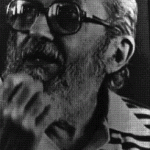My Father’s Recommendations
When I was an undergrad in the UW Milwaukee film program my father recommended I see four movies. He hoped they would encourage me to pursue a career in law, which I was generally opposed to, not really knowing any lawyers well and aware that just about everyone hates lawyers. I think he wanted me to see that attorneys can, at times, play a role in society more useful than that of the punch line to a joke.
Similar to Hemingway’s list of books that he “would rather read again for the first time . . . than have an assured income of a million dollars a year,” these titles, for me, have served as guiding lights, models of what practicing the law can be:
1. Inherit the Wind (1960) – A Hollywood dramatization of the Scopes trial that occurred in Tennessee in 1925 over the teaching of evolution in schools, you have to stomach some quaint plot exposition to get to the engaging courtroom scenes. A favorite is the defense’s questioning of a young boy who had been exposed to the science teacher’s course. He asks the young man: “What Mr. Cares told you, did it hurt your baseball game any? Affect your pitching arm any?” This simple line of questioning goes a long way in conveying the frivolousness of the charge. The ending is satisfactorily honest, deviating from the Hollywood formula and staying true to the real case, in that the defense loses.

